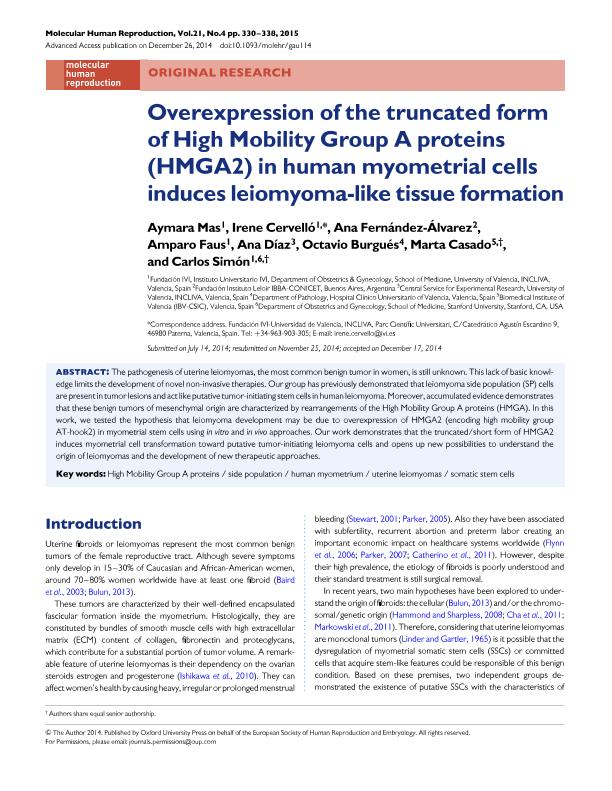Mostrar el registro sencillo del ítem
dc.contributor.author
Mas, Aymara
dc.contributor.author
Cervelló, Irene
dc.contributor.author
Fernández Alvarez, Ana Julia

dc.contributor.author
Faus, Amparo
dc.contributor.author
Díaz, Ana
dc.contributor.author
Burgués, Octavio
dc.contributor.author
Casado, Marta
dc.contributor.author
Simón, Carlos
dc.date.available
2019-09-24T20:19:09Z
dc.date.issued
2014-12
dc.identifier.citation
Mas, Aymara; Cervelló, Irene; Fernández Alvarez, Ana Julia; Faus, Amparo; Díaz, Ana; et al.; Overexpression of the truncated form of high mobility group a proteins (HMGA2) in human myometrial cells induces leiomyoma-like tissue formation; Oxford University Press; Molecular Human Reproduction; 21; 4; 12-2014; 330-338
dc.identifier.issn
1360-9947
dc.identifier.uri
http://hdl.handle.net/11336/84331
dc.description.abstract
The pathogenesis of uterine leiomyomas, the most common benign tumor in women, is still unknown. This lack of basic knowledge limits the development of novel non-invasive therapies. Our group has previously demonstrated that leiomyoma side population (SP) cells are present in tumor lesions and act like putative tumor-initiating stemcells in human leiomyoma. Moreover, accumulated evidence demonstrates that these benign tumors of mesenchymal origin are characterized by rearrangements of the High Mobility Group A proteins (HMGA). In this work, we tested the hypothesis that leiomyoma development may be due to overexpression of HMGA2 (encoding high mobility group AT-hook2) in myometrial stem cells using in vitro and in vivo approaches. Our work demonstrates that the truncated/short form of HMGA2 induces myometrial cell transformation toward putative tumor-initiating leiomyoma cells and opens up new possibilities to understand the origin of leiomyomas and the development of new therapeutic approaches.
dc.format
application/pdf
dc.language.iso
eng
dc.publisher
Oxford University Press

dc.rights
info:eu-repo/semantics/openAccess
dc.rights.uri
https://creativecommons.org/licenses/by-nc-sa/2.5/ar/
dc.subject
HIGH MOBILITY GROUP A PROTEINS
dc.subject
HUMAN MYOMETRIUM
dc.subject
SIDE POPULATION
dc.subject
SOMATIC STEM CELLS
dc.subject
UTERINE LEIOMYOMAS
dc.subject.classification
Bioquímica y Biología Molecular

dc.subject.classification
Ciencias Biológicas

dc.subject.classification
CIENCIAS NATURALES Y EXACTAS

dc.title
Overexpression of the truncated form of high mobility group a proteins (HMGA2) in human myometrial cells induces leiomyoma-like tissue formation
dc.type
info:eu-repo/semantics/article
dc.type
info:ar-repo/semantics/artículo
dc.type
info:eu-repo/semantics/publishedVersion
dc.date.updated
2019-05-10T14:03:41Z
dc.journal.volume
21
dc.journal.number
4
dc.journal.pagination
330-338
dc.journal.pais
Reino Unido

dc.journal.ciudad
Oxford
dc.description.fil
Fil: Mas, Aymara. Universidad de Valencia; España
dc.description.fil
Fil: Cervelló, Irene. Universidad de Valencia; España
dc.description.fil
Fil: Fernández Alvarez, Ana Julia. Consejo Nacional de Investigaciones Científicas y Técnicas. Oficina de Coordinación Administrativa Parque Centenario. Instituto de Investigaciones Bioquímicas de Buenos Aires. Fundación Instituto Leloir. Instituto de Investigaciones Bioquímicas de Buenos Aires; Argentina
dc.description.fil
Fil: Faus, Amparo. Universidad de Valencia; España
dc.description.fil
Fil: Díaz, Ana. Universidad de Valencia; España
dc.description.fil
Fil: Burgués, Octavio. Universidad de Valencia; España
dc.description.fil
Fil: Casado, Marta. University of Stanford; Estados Unidos
dc.description.fil
Fil: Simón, Carlos. Universidad de Valencia; España
dc.journal.title
Molecular Human Reproduction

dc.relation.alternativeid
info:eu-repo/semantics/altIdentifier/doi/http://dx.doi.org/10.1093/molehr/gau114
dc.relation.alternativeid
info:eu-repo/semantics/altIdentifier/url/https://academic.oup.com/molehr/article/21/4/330/983207
Archivos asociados
